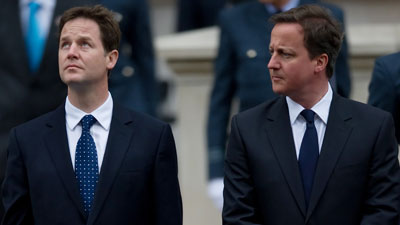 After five days’ negotiations, the Liberal Democrats have finally agreed to form a neo-liberal coalition with the Tories. The ruling class was never bothered about the political complexion of any incoming government so long as it was committed to axe public spending and make the working class pay for the crisis. The Liberal Democrats had always stated that such cuts should not start this year, but then conceded this to its Tory partners. Socialists however should have no regrets about the defeat of the Labour Party, sealed by the resignation of Gordon Brown as party leader. Its warmongering, its attacks on civil liberties, on asylum seekers and on immigrants made it no better than the Tories (see FRFI 214: General Election – General fraud). Had it been elected, it would have attacked public sector workers as viciously as the incoming coalition.
After five days’ negotiations, the Liberal Democrats have finally agreed to form a neo-liberal coalition with the Tories. The ruling class was never bothered about the political complexion of any incoming government so long as it was committed to axe public spending and make the working class pay for the crisis. The Liberal Democrats had always stated that such cuts should not start this year, but then conceded this to its Tory partners. Socialists however should have no regrets about the defeat of the Labour Party, sealed by the resignation of Gordon Brown as party leader. Its warmongering, its attacks on civil liberties, on asylum seekers and on immigrants made it no better than the Tories (see FRFI 214: General Election – General fraud). Had it been elected, it would have attacked public sector workers as viciously as the incoming coalition.
Overall turnout at the election at 65% was 4% higher than in 2005. However, the Tories failed to secure the absolute parliamentary majority that seemed likely after Labour’s electoral meltdown in 2007-09. Tory support amongst the AB social groups (higher and immediate managerial, administrative and professional) fell by 1% while that for Labour rose by the same amount. These groups include many who are employed within the public sector or depend on public sector outputs. Turnout in inner-city and predominantly working class constituencies in many cases went up by 10% or more so that in some places people were unable to vote because of a shortage of staff, equipment or even ballot papers. This increase in turnout compensated for a small swing away from Labour amongst DE social groups (semi and unskilled manual workers, pensioners and the poorest sections of the working class); 44% voted Labour compared to 28% for the Tories. Amongst the C2 social group – skilled workers – support for Labour fell by nearly half, from 40% to 22%. With limited increases in support from the C2 group (6%) and from the C1 lower middle class, the Tories were able to pick up 89 marginal seats from Labour and become the largest party in Parliament. In Scotland, Labour support rose overall by 2.5%, and it won back two seats it had lost in by-elections.
The BNP did poorly, polling only 14.6% in Barking where its leader Nick Griffin was standing, and 7.7% in its second target seat, Stoke-on-Trent Central. Elsewhere it averaged less than 5%. Its performance confirmed the point that the BNP are not a significant threat: Labour had given sufficient demonstration of its racist credentials with its attacks on immigrants and asylum seekers.
The real losers were the opportunist left. Most urged us to support Labour despite its record, claiming that the Tories would be worse. Where they stood candidates in the general election, they gave legitimacy to a completely fraudulent process. Overall their performance was abysmal especially given that we are living through the worst imperialist crisis for 80 years. Respect lost the single seat it had won in 2005. Elsewhere most left candidates received 1% of the vote or less. Voters regarded them as an irrelevance.
Fight Racism! Fight Imperialism! has constantly argued that there has to be a clear and uncompromising break with Labour to forge a new socialist movement. This task will become more and more urgent as working class resistance develops against the forthcoming attacks on the state sector. Join us in building it.




